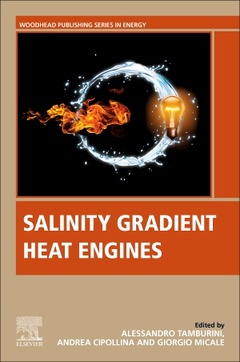Salinity Gradient Heat Engines Woodhead Publishing Series in Energy Series
Coordonnateurs : Tamburini Alessandro, Cipollina Andrea, Micale Giorgio

Salinity Gradient Heat Engines classifies all the existing SGHEs and presents an in-depth analysis of their fundamentals, applications and perspectives. The main SGHEs analyzed in this publication are Osmotic, the Reverse Electrodialysis, and the Accumulator Mixing Heat Engines. The production and regeneration unit of both cycles are described and analyzed alongside the related economic and environmental aspects. This approach provides the reader with very thorough knowledge on how these technologies can be developed and implemented as a low-impact power generation technique, wherever low-temperature waste-heat is available.
This book will also be a very beneficial resource for academic researchers and graduate students across various disciplines, including energy engineering, chemical engineering, chemistry, physics, electrical and mechanical engineering.
2. State of the art of conventional and nonconventional heat engines
3. Osmotic Heat Engines (OHE)
4. Reverse Electrodialysis Heat Engine (REDHE)
5. Solvent Extraction Regeneration Technologies
6. Salt Extraction Regeneration Technologies
7. Coupling Salinity Gradients Heat Engines with power generation systems
8. Special engines
9. Environmental aspects, process performance analysis and economics of SGHE
Engineers, professionals and researchers in fields of energy production, energy efficiency and sustainability; innovators within the industrial sector involved in processes where low-temperature waste heat is available; R&D managers in industry; academic researchers, graduate students in energy, but also chemical engineering, chemistry, physics, electrical and mechanical engineering disciples
Dr. Andrea Cipollina is Senior Assistant Professor of Conceptual Design of Chemical Processes. He is heavily involved in research activities on water desalination and renewable energy technologies as well as Salinity Gradient Power processes, with a particular focus on Computer Aided Process modelling and optimisation, fluid flow characterization and prototype design, commissioning and operation applied to desalination and membranes-based SGP technologies. He has published more than 100 works as journal papers or conference contributions in the field of desalination, SGP technologies and membrane separation. He was awarded with the Senior Moulton Medal 2013 by the Institution of Chemical Engineers (UK). He is the editor of Sustainable Energy from Salinity Gradient, Woodhead Publishing, 2016.
Dr Giorgio Micale is a Professor of Conceptual Design of Chemical Processes. His core research topics are the study of Conventional and Renewable Energy Desalination processes,
- Focuses on advanced, yet practical, recovery of waste heat via salinity gradient heat engines
- Outlines the existing salinity gradient heat engines and discusses fundamentals, potential and perspectives of each of them
- Includes economics and environmental aspects
- Provides an innovative reference for all industrial sectors involving processes where low-temperature waste-heat is available.
Date de parution : 11-2021
Ouvrage de 374 p.
15.2x22.8 cm
Thème de Salinity Gradient Heat Engines :
Mots-clés :
Salinity gradient heat engines (SGHEs); heat engines; waste heat recovery; reverse electrodialysis; pressure retarded osmosis; accumulator mixing; thermolytic salts; multi effect distillation; membrane distillation; low-temperature waste heat; osmotic heat engines; reverse electrodialysis heat engines; Accumulator Mixing Heat Engine; Solvent Extraction Regeneration Technologies; Salt Extraction Regeneration Technologies; Coupling with power generation systems; Swelling/shrinking hydrogels engines; Thermally Regenerative Ammonia Battery; environmental concerns; power generation; energy economics; energy efficiency; sustainability



